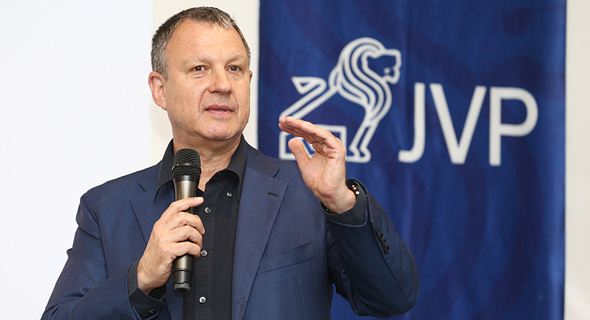"We Must Treat the Epidemic the Way Twitter Handles News: Make Medical Solutions Real Time and Democratic"
Stanford University Medicine Professor Nirav Shah spoke Tuesday at a virtual conference held Tuesday by Jerusalem-based venture firm Jerusalem Venture Partners (JVP)
12:4825.03.20
Leaders of government, health, technology, and economy from around the world attended a virtual conference Tuesday to address the role of innovation and startups in combating the Covid-19 crisis. The event, led by Erel Margalit, founder and chairman of Jerusalem Venture Partners (JVP), hosted medical and policy experts to discuss and share their best practices and methods for using innovation in diagnostics, prevention, treatment, and more. The participants issued a call for more proactive synergy between governments and world leaders, including the global sharing of data.
"The virus is evolving. This is a 21st century disease and we need to arm ourselves with 21st century tools," said Dr. Nirav Shah, MD, a professor of medicine at Stanford University, who spoke at the event. "We need to do what Twitter did to the news cycle: make it real time and democratic, so that medical solutions are more widely available and impactful."

JVP's founder and CEO Erel Margalit. Photo: Orel Cohenצילום: אוראל כהן
"We are situated in different countries. Let us remember that the only way this is contained is for the leaders to work together to coordinate strategies and best practices between countries," Margalit said. "It is the only way to be effective."
"We are facing a situation which has never happened before," Davide Falasconi, Italy's chief innovation officer, said of the situation facing his country. "But it is not only an Italian issue. We have some regions which are incredibly under pressure." Pinpointing some of the technological steps being taken in Italy, he said, "We are enabling digital services to provide their services for free" to benefit companies and residents.
Lindsay Clinton, executive vice president of the industry and innovation group at New York City Economic Development Corporation, outlined the situation in New York, currently the center of the pandemic in the U.S. "Our priorities are identifying additional hospital and medical space, identifying additional availability of medical supplies and additional staff," Clinton said. In particular, she described efforts to develop a local ecosystem of decentralized production for much-needed face shields, isolation gowns, ventilators, and other essential items. Clinton described the enthusiasm of local manufacturers. "Within 24 hours of issuing a call, we had prototypes of face shields and other items," she said.
Related articles
Dr. Eran Zehavy, chief innovation coordinator at the Israel Institute of Biological Research, outlined the institute's efforts to develop a vaccine. "We started to see in early January that this virus would be a serious problem," Zehavy said. "Luckily, we arranged lots of tools in early January. So, when we received the order to work on vaccine development, we were already somewhat prepared. We started to shift all our research towards that target, and we already have very encouraging results," he said. "We are trying as much as possible to collaborate," Zehavy said, adding that his institute had signed agreements with three companies, including two startups.
Dr. Galia Barkai of Sheba Tel Hashomer Medical Center in central Israel noted that the hospital was the first in the country to treat coronavirus patients. "This corona crisis made us harness technology. We had to build a facility with minimal physical contact. This is not in our DNA," Barkai said. "We placed patients inside the facility; the staff was outside in an inflatable tent with all the monitors and other equipment. It enabled physicians to do everything they needed to do while protecting staff from being infected."



